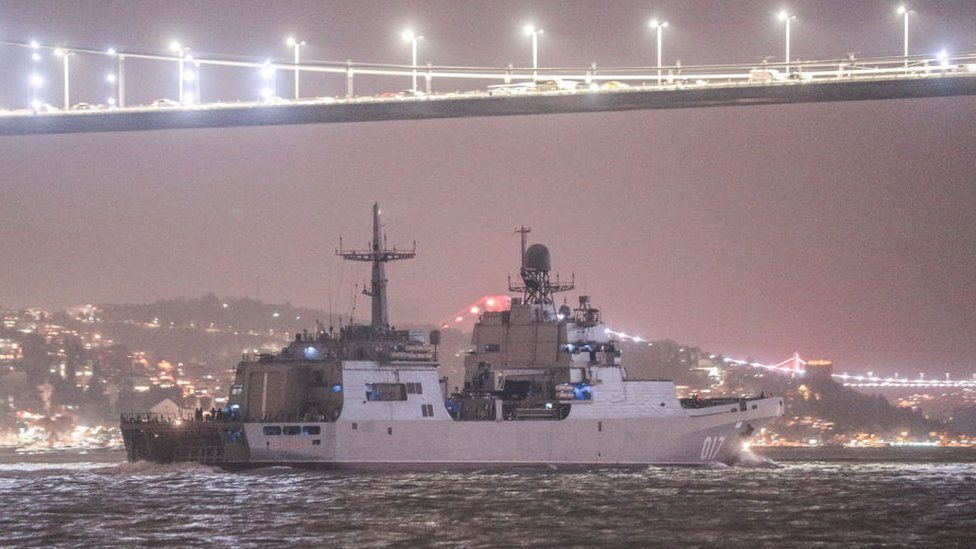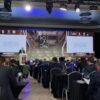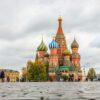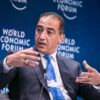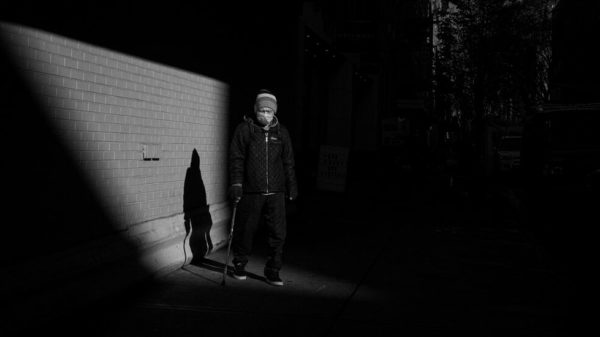Ukraine has accused Russia of blocking its access to the sea as Russia prepares for naval exercises next week amid spiralling tension in the region.
Ukrainian Foreign Minister Dmytro Kuleba said the Sea of Azov was completely blocked and the Black Sea almost fully cut off by Russian forces.
Russia has repeatedly denied any plans to invade Ukraine despite massing more than 100,000 troops at the border.
But it has just begun days of military drills with neighbouring Belarus.
Belarus is a close ally of Russia and has a long border with Ukraine.
France called the drills – believed to be Russia’s biggest deployment to Belarus since the Cold War – a “violent gesture”. Ukraine says they amount to “psychological pressure”.
Meanwhile, UK Prime Minister Boris Johnson said on Thursday that Europe faces its biggest security crisis in decades amid the tensions.
Russia’s naval exercises will take place next week in the two seas to the south of Ukraine, the Black Sea and the Sea of Azov. Russia has issued coastal warnings citing missile and gunnery firing exercises.
Ukraine’s foreign ministry said the “unprecedentedly vast area where the manoeuvres will be conducted makes navigation in both seas practically impossible”, and Defence Minister Oleksiy Reznikov tweeted that the international waters of the two seas had been blocked by Russia.


Tensions have been high between Russia and Ukraine in the Black Sea and Sea of Azov regions since Russia annexed Crimea in 2014. In 2018, Russia seized three Ukrainian naval vessels.
The naval exercises off Ukraine’s southern flank are in addition to the 10 days of military exercises currently underway in Belarus, to the north of Ukraine.
Russia has also amassed tanks, artillery and tens of thousands of troops close to its own border with Ukraine, but denies planning to invade. The US and other Western countries have warned that an attack could come at any time.
‘Psychological pressure’
The military exercises in Belarus – known as Allied Resolve 2022 – are taking place close to the Belarusian border with Ukraine, which is a little over 1,000km (620 miles) long. Some 30,000 Russian troops are thought to be involved.
There are fears that if Russia tries to invade Ukraine, the exercises put the Russian military close to the Ukrainian capital, Kyiv, making an attack on the city easier.
Belarus leader Alexander Lukashenko is a firm ally of Russian President Vladimir Putin and the two countries have created a so-called “Union State” which includes economic and military integration.


Russia says its troops will return to their permanent bases after the drills end, but Ukraine and its Western allies have expressed concern.
“The accumulation of forces at the border is psychological pressure from our neighbours,” Ukrainian President Volodymyr Zelensky said on Thursday.
French Foreign Minister Jean-Yves Le Drian told France Inter radio that it was a “very violent gesture”, and the US has called the exercises an “escalatory” move.

‘Dangerous moment’
The military exercises come as world leaders continue their frenzied diplomacy in an attempt to defuse the current crisis over Ukraine.
In a joint news conference with Nato Secretary General Jens Stoltenberg, UK Prime Minister Boris Johnson said he didn’t think a decision about a Russian invasion of Ukraine had been made yet, but warned that “this is probably the most dangerous moment… in what is the biggest security crisis that Europe has faced for decades”.
Meanwhile the UK’s Foreign Secretary Liz Truss met her Russian counterpart Sergei Lavrov in Moscow on Thursday. She said Russia should move its troops away from the Ukrainian border if it was serious about using diplomacy to defuse the crisis.
Mr Lavrov said he was disappointed with the talks, accusing Ms Truss of not listening to Russia’s concerns.

Moscow says it cannot accept that Ukraine – a former Soviet republic with deep social and cultural ties with Russia – could one day join the Western defence alliance Nato and has demanded that this be ruled out. It has been backing an armed rebellion in eastern Ukraine since 2014.
There is some suggestion that a renewed focus on the so-called Minsk agreements – which sought to end the conflict in eastern Ukraine – could be used as a basis to defuse the current crisis.
Ukraine, Russia, France and Germany backed the accords in 2014-2015.

No warming of the frosty diplomatic ground

On the basis of this morning’s news conference in Moscow, relations between Russia and Britain remain as cold as ever.
The exchanges began slowly. Sergei Lavrov began with a gentle recitation of Russia’s demands and said the talks had improved the UK’s understanding of those demands.
Liz Truss responded by rejecting Russia’s core argument, namely that its security is somehow threatened by Nato expansion and the possibility of Ukraine joining the military alliance. “That is just not true,” she said.
She accused Russia of using aggression to try to “relitigate the past” in a way that was undermining its international standing. This lit Mr Lavrov’s fuse and he hit back.
The talks had been “disappointing”, he said, adding that it was as if the two sides were listening but not hearing. He accused the UK and the West of “hysteria” that was destabilising Ukraine. The West was demanding guarantees from Russia but offering none back in what he described as a “one sided dialogue”.
Ms Truss responded robustly: Russia’s 100,000 troops were threatening Ukraine, she said, Russia needed to abide by agreements it had signed not to do so, and it needed to implement a ceasefire in eastern Ukraine.
Mr Lavrov responded, again at length: Nato had promised not to expand but it had – the alliance had a history of being aggressive and cited the former Yugoslavia and Iraq as an example. He also compared the Ukrainian President Zelensky to the Nazi propagandist, Joseph Goebbels.
So diplomacy took place, messages were delivered and received. But there appeared little progress – and no warming of the frosty ground dividing Britain and Russia.

You might also be interested in watching:
This video can not be played
To play this video you need to enable JavaScript in your browser.

